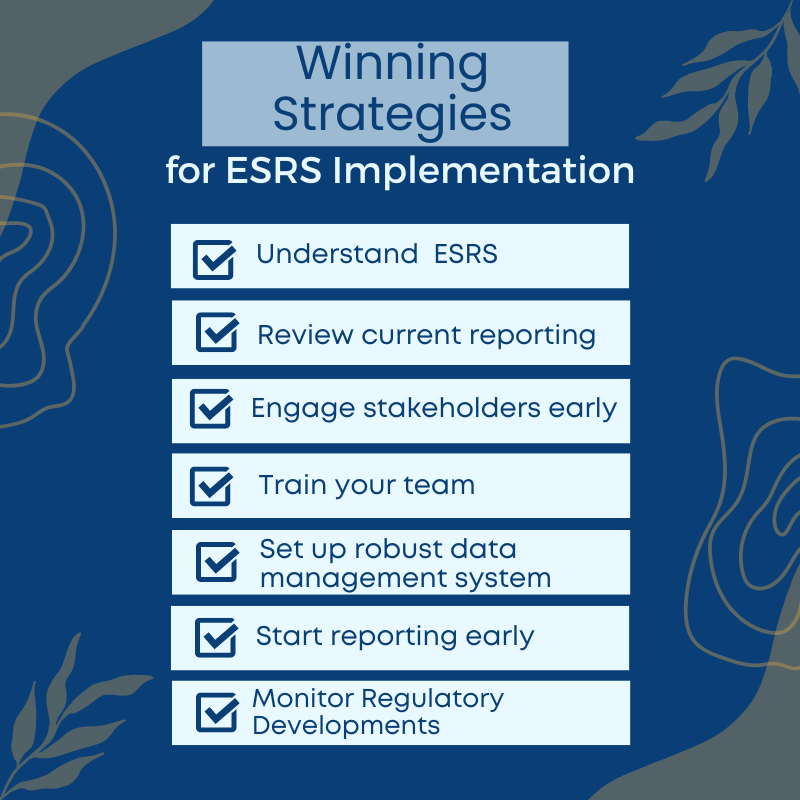The European Commission (EC) has just achieved a significant milestone in the realm of sustainability reporting with the adoption of the European Sustainability Reporting Standards (ESRS). This remarkable development marks a pivotal moment in the European Union’s commitment to promoting sustainability and transparency among companies operating within its borders. The adoption of these standards comes as part of the broader Corporate Sustainability Reporting Directive (CSRD) framework, aimed at strengthening sustainability reporting requirements for businesses across the EU.
How to download the adopted ESRS standards?
You can find more details on this adoption of the ESRS standards in this Q&A by the EC.
The adopted ESRS standards can be downloaded from the EC website. It is important to note that these adopted text are “not in force until it is published in the Official Journal” according to the EC.
The Significance of ESRS in Promoting Sustainability Reporting Across the EU
The adoption of the European Sustainability Reporting Standards holds immense significance for various reasons:
- Standardization and Transparency: The ESRS will bring uniformity to sustainability reporting practices across the EU. By providing a common framework, companies will be able to communicate their sustainability efforts transparently, making it easier for stakeholders to compare and evaluate their performances.
- Enhanced Corporate Accountability: With standardized reporting guidelines, companies will be compelled to disclose their sustainability initiatives accurately and comprehensively. This increased accountability will foster a culture of responsible business practices and environmental stewardship.
- Investor Confidence and Decision-making: Clear and comparable sustainability reporting will enable investors to make informed decisions. By assessing companies’ environmental, social, and governance (ESG) performance, investors can direct their capital towards businesses committed to sustainable practices.
- Positive Environmental and Social Impact: The ESRS will encourage companies to align their strategies with sustainable development goals, contributing to a positive impact on the environment and society at large.
- Global Leadership: By implementing robust sustainability reporting standards, the EU reinforces its position as a global leader in sustainability practices. This can inspire other regions and nations to follow suit and contribute to a more sustainable future for the planet.
With the adoption of the European Sustainability Reporting Standards (ESRS), companies operating within the European Union are poised to embark on a transformative journey towards sustainability and responsible business practices. Embracing the ESRS presents a unique opportunity for businesses to not only comply with regulatory requirements but also leverage sustainability reporting as a strategic tool to drive positive change and enhance their competitive advantage.
What’s Next for Companies: Embracing the ESRS Opportunity
1. Integration of Sustainability into Business Strategy:
Companies must view sustainability reporting as more than just a regulatory obligation. It is an opportunity to align sustainability with their core business strategy. By integrating environmental, social, and governance (ESG) considerations into decision-making processes, companies can identify new opportunities, reduce risks, and drive innovation while contributing to a more sustainable economy.
2. Data Collection and Reporting Systems:
As the ESRS come into effect, companies need to establish robust data collection systems to capture relevant sustainability metrics. This involves gathering data on environmental impacts, social initiatives, diversity and inclusion efforts, and governance practices. Implementing reliable reporting systems ensures accurate disclosure and provides a basis for setting achievable sustainability targets.
3. Transparency and Stakeholder Engagement:
The ESRS emphasize transparency in sustainability reporting. Companies must engage with stakeholders, including customers, investors, employees, and local communities, to understand their concerns and expectations regarding sustainability. Open and constructive dialogues foster trust and can lead to valuable insights for companies to enhance their sustainability efforts.
4. Setting Ambitious Sustainability Goals:
To drive meaningful change, companies should set ambitious and measurable sustainability goals aligned with the ESRS. These goals should address material sustainability issues relevant to the company’s industry and operations. Ambitious targets not only demonstrate commitment but also act as a catalyst for continuous improvement.
5. Enhanced ESG Reporting and Communication:
Sustainability reporting is an opportunity for companies to communicate their ESG performance and progress effectively. It is essential to present information clearly and concisely, catering to the needs of diverse stakeholders. Engaging narratives and visualizations can make sustainability reports more accessible and impactful.
6. Building a Sustainability Culture:
Sustainability reporting goes beyond data collection; it reflects a company’s commitment to sustainability as a core value. Companies should focus on fostering a sustainability culture by involving employees at all levels, encouraging innovative ideas, and recognizing and rewarding sustainable practices.
7. Engaging with External Experts:
Navigating the complex landscape of sustainability reporting may require expertise beyond a company’s internal capabilities. Engaging with sustainability experts, consultants, or sustainability-focused organizations can provide valuable guidance and support in meeting the ESRS requirements effectively.
The Journey Towards ESRS Adoption: A Timeline
April 21, 2021 – Legislative Proposal for CSRD: The journey towards the ESRS adoption began with the proposal for the Corporate Sustainability Reporting Directive (CSRD). The proposal sought to amend the reporting requirements of the Non-Financial Reporting Directive (NFRD) to further enhance the sustainability disclosure practices of companies operating in the EU.
March 8, 2021 – EFRAG Reports on EU Sustainability Reporting Standards: The European Financial Reporting Advisory Group (EFRAG) took a significant step forward by reporting on the development of EU sustainability reporting standards. This report laid the groundwork for shaping the future of sustainability reporting within the region.
June 22, 2022 – Political Agreement on CSRD: The European Parliament and the Council reached a crucial political agreement on the Corporate Sustainability Reporting Directive. This agreement set the stage for robust sustainability reporting legislation in the EU.
November 23, 2022 – First Set of Draft EU Sustainability Reporting Standards: EFRAG published the first set of draft EU sustainability reporting standards, laying out a comprehensive framework to guide companies in reporting their sustainability performance accurately and transparently.
December 14, 2022 – Publication of CSRD: The Corporate Sustainability Reporting Directive was officially published in the Official Journal. This step solidified the legal framework for sustainability reporting within the EU.
June 9, 2023 – Feedback Process for ESRS: The European Commission initiated a crucial feedback process for the first set of draft sustainability reporting standards. This process allowed stakeholders to provide valuable input during a four-week public feedback period.
July 31, 2023 – Adoption of ESRS: Today, the European Commission successfully adopted the European Sustainability Reporting Standards (ESRS), signifying a pivotal moment in the journey towards promoting sustainability reporting in the EU.
Conclusion
The adoption of the European Sustainability Reporting Standards presents an exciting opportunity for companies subject to the Corporate Sustainability Reporting Directive (CSRD) to lead the charge in sustainability reporting within the European Union. By embracing the ESRS and incorporating sustainability into their DNA, businesses can not only comply with regulatory demands but also drive positive change, gain a competitive edge, and contribute to a more sustainable and resilient future for the EU and the global community. Seizing this opportunity is not only the responsible thing to do but also the pathway to long-term success in a world where sustainability matters more than ever.
Your Next Step on the CSRD Compliance Journey
Are you ready to spearhead your company’s sustainability journey and stand out from the crowd? The Corporate Sustainability Reporting Directive (CSRD) and European Sustainability Reporting Standards (ESRS) are not only coming but are here, and your next steps are critical.
Mastering the complexities of the CSRD and ESRS can seem like a daunting task. However, overcoming this challenge doesn’t just mean compliance with new laws – it’s an opportunity to show your commitment to a sustainable future, to gain a competitive edge, and to attract stakeholders who value responsibility.
We know it might be overwhelming, but you’re not alone in this journey. Imagine having all the necessary tools, knowledge, and support at your fingertips. That’s where The CSRD Compass steps in. We’re your ultimate guide to everything CSRD and ESRS, offering a rich collection of resources ranging from detailed guides and insightful articles to comprehensive courses and expert analysis. Navigating this new terrain of sustainability reporting has never been easier!
Don’t wait for tomorrow. The time to act is now. Embark on your sustainability reporting journey today, prepare your business for a sustainable future and make a real impact on our planet. Visit The CSRD Compass today, and let’s shape a greener future together!


